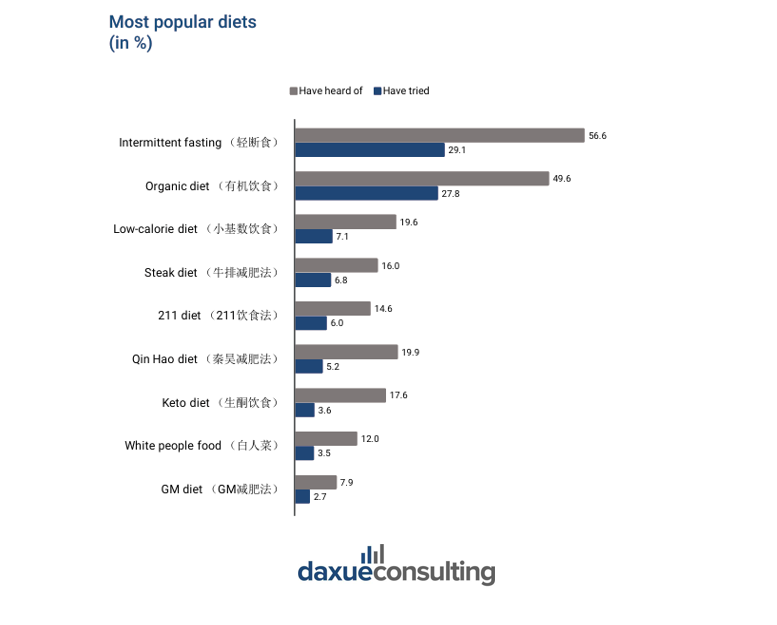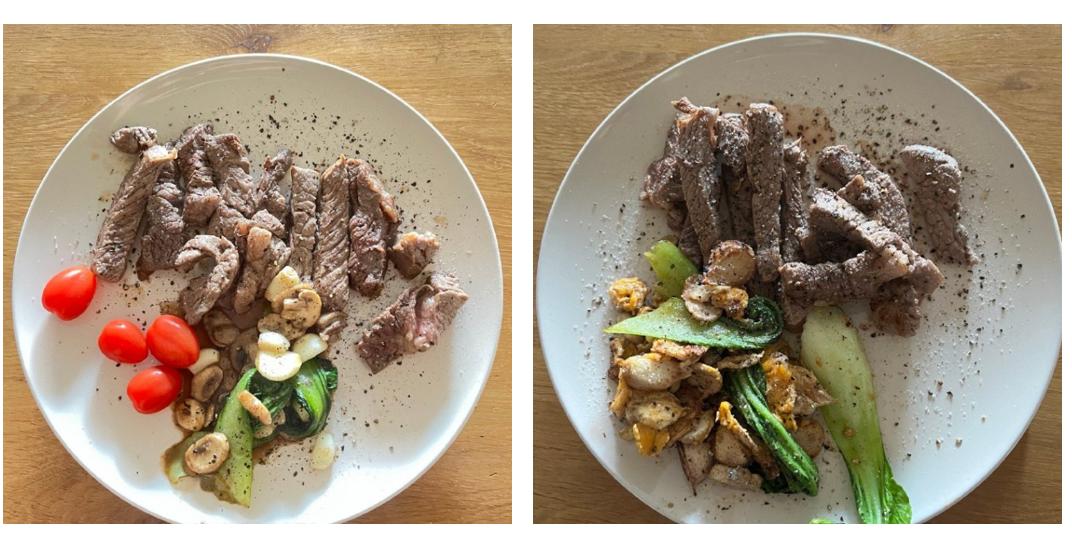As dietary preferences continue to evolve globally, China is witnessing the emergence of various diet trends. Based on the Daxue Consulting survey, prominent diets in China include intermittent fasting (29.1%), organic diet (27.8%), and low-calorie diet (7.1%). Additionally, food tribes like keto, 211, and steak diets are gaining traction on social media platforms, boosted by influencers such as Key Opinion Leaders (KOLs) and celebrities.
These healthy food tribes, driven by weight loss and healthier living goals, actively influence young Chinese consumers and share success stories on platforms like Douyin and Xiaohongshu, where new health food recipes are also discovered. This trend not only reflects changing nutritional preferences but also underscores the significant role of social media in shaping dietary trends in the Chinese market.

Source: daxueconsulting.com, results of the survey about the most popular diets in China
Download our China’s F&B industry white paper

Keto diet: cutting carbohydrates is even more popular among Chinese consumers
Keto diet is one of the most popular eating plans adopted by Chinese consumers. The ketogenic diet (keto) was originally developed in the United States as a therapeutic approach for treating seizures. In recent years, the keto diet has experienced a resurgence in popularity, primarily as a weight loss and wellness approach, and eventually reached China as recently as 2017.
China’s keto diet tribe was spread mainly by social media like Xiaohongshu, and KOLs and celebrities such as the Chinese actor and director Dong Chengpeng (董成鹏). Despite the US having spread the trend worldwide, the keto diet in China has a history of over 2,000 years. Indeed, Bigu (辟谷) or “grain avoidance” is an ancient Taoist practice consisting of avoiding eating grains such as rice, wheat and soybeans. The method had a double purpose, both physically and spiritually, because it was believed to heighten an individual’s spirit. Apart from the traditional explanation, there is also a scientific reason behind this lifestyle: carbohydrates are the default fuel of the body, but when there are no carbs available, the body goes into ketosis and uses fat for fuel. The keto diet tribe leverages this bodily function to lose weight by almost entirely cutting carbs out of their diet.

Source: daxueconsulting.com, keto diet tribe preferences
Women make up almost the entirety of Keto diet followers in China
According to Daxue survey, 3.6% have tried the keto diet. The primary demographic exploring this diet consists of Millennials (72.2%), followed by individuals aged 18 to 25 (16.7%). A significant proportion (72.2%) resides in first and new first-tier cities. Gender disparity is notable, with roughly two-thirds being women and one-third being men. Those who have experimented with keto predominantly earn monthly salaries between RMB 10,000 and 50,000 (72.3%).
The reason why so many younger people follow this type of diet is partially linked to social media, with fitness influencers and KOLs who promote it as the best way of losing weight by cutting carbohydrates. As of April 2024, the hashtag “生酮饮食” (Ketogenic Diet) has more than 170 million views on Weibo.
Intermittent fasting and high-fat products are the keywords for the keto diet
On social media, many integrate the keto diet with a 16:8 intermittent fasting routine, consuming meals within an eight-hour window and fasting for 16 hours. Weibo’s hashtag #轻断食+生酮饮食+运动=健康与苗条 (intermittent fasting + keto diet + exercise = healthy and slim) has over 2.2 million reads. Users praise this lifestyle, especially for its effectiveness and believe that intermittent fasting combined with constant exercise and health supplements can improve the individual’s health and help with weight loss.

Source: Xiaohongshu, some netizens combine the keto diet with intermittent fasting
Intermittent fasting is popular in China, with 29.1% of surveyed individuals having explored it, particularly among women (64.3%). Integrating keto with intermittent fasting is believed to enhance fat burning by restricting carbohydrates and glycogen, prompting the body to rely on fat for fuel.
Despite this trend, on social media, the keto community endorses brands of low-carb, high-fat products. One example is Bulletproof coffee, which is a high-fat drink made from coffee combined with unsalted butter and fat, usually coconut oil, that’s intended to provide sustained energy and mental clarity throughout the day.
Furthermore, unlike the general population and other food tribes, members of the keto tribe exhibit a preference for using air frying as one of their primary cooking methods. The use of an air fryer provides a healthier alternative for frying, allowing individuals to maintain the desired taste and texture of their health foods.
Keto diet is not as easy as it seems, and consumers may face health issues
Because this diet is relatively restrictive, it fosters a sense of community among participants who encounter the same challenges, such as finding low-carb alternatives. Furthermore, there are many critics of the keto diet raising health concerns regarding nutritional imbalance, potential side effects like the “keto flu”, and long-term feasibility. First, critics argue that carbohydrate restriction may lead to nutrient deficiencies, such as vitamin B, commonly found in whole grains, cereal, bread, beans, and fruits. Moreover, this kind of diet may cause the so-called “keto flu”, characterized by frequent headaches, fatigue, irritability, nausea, and constipation. Nevertheless, our survey indicates that keto tribe members show a big health awareness of this nutrient gap and are more likely to purchase B-complex health supplements.
The way of sustainable weight loss: the case of 211 dieters
Led by Chinese singer He Jie (何洁), the 211 diet tribe gained traction on Xiaohongshu after she shared her weight loss journey, dropping from 80kg to 45kg. Her story quickly became popular, emphasizing the importance of three meals a day, each comprising 50% fruits and vegetables, 25% meat, and 25% staple food. The members of the 211 tribe prioritize balance in nutrients for sustainable weight loss, rather than eliminating any of them.
Additionally, the popularity of the 211 diet tribe is further emphasized by Dr. Song Yanren’s book, “A Lifetime of Slimming: the 211 Full Balance Weight Loss Method” (终生瘦用211全平衡瘦身法) published in 2019. This book serves as a notable reference for the community, detailing the personal weight loss journey of Dr. Song, who successfully shed 20kg by adhering to the principles of the 211 diet.
Unlike Keto diet followers, 211 dieters prefer food balancing rather than food privation
Younger people represent the biggest group to have followed the 211 diet at least once. Indeed, the age group between 26 and 40 shows a higher participation rate, with 63.3% of individuals who have tried the 211 diet falling within this age range, followed by 18% between 41 and 60.
Followers of this diet usually do not enforce strict food restrictions but focus on portion control and a generally low-fat or fat-free approach similar to the keto tribe, they also share fitness routines and culinary experiments based on organic foods online, offering insights into their health journeys. The trend is very popular on Weibo; as of April 2024, the hashtag “211饮食” (211 diet) has more than 198,000 views of Weibo.

Organic food enthusiasts: a healthy and expensive lifestyle
The surge in the organic food market in China is a response to growing food safety concerns. Beginning in 2000, organic and healthy foods entered the domestic market. This was followed by the emergence of non-food items like organic cotton clothes and cosmetics in first-tier cities in 2007. Subsequently, supermarkets began offering organic fruits and vegetables, contributing to the projected USD 30.9 billion organic market by 2028.
The unique focus of the organic food community sets it apart from other dietary groups. Unlike some, this community is motivated not only by weight loss goals but also by a broader commitment to a healthy lifestyle.
Indeed, organic foods enthusiasts, especially from the Chinese middle class, often display an interest in horticulture, showcasing home-grown potted vegetables and herbs online. They are also avid tea drinkers, with 78.5% consuming tea more than once a week, compared to 66.7% of the keto tribe and 68.1% of the 211 diet tribe. Because of the home-grown trend which is developing among organic dieters, this lifestyle can be less accessible to a broader population because of the high costs. Furthermore, the nutritional differences between conventional and organic food products may not be substantial enough to justify the higher cost.

When vegetables are completely abandoned: the trend of steak diet in China
The steak diet gained prominence initially through the influence of a Chinese Douyin KOL named CC in early 2022. Known as the “CC beef weight loss method,” it involves consuming two pieces of lean beef at every meal for five consecutive days, followed by 25 days of three meals within an 8-hour window, aligning with intermittent fasting principles. Following this, an increasing number of individuals on Xiaohongshu began experimenting with this diet to assess its effectiveness.

Source: weibo.com, an example of steak diet dishes shared by Weibo users
Similar to the keto diet, it focuses on fat burning by significantly reducing carbohydrate intake while increasing protein consumption. Although the core concept of daily meals revolves around eating steak and vegetables, members of the steak tribe prioritize protein consumption, with 11.8% of the survey responders considering protein content when purchasing their food. For this reason, the main critics of this diet are linked especially to excessive meat consumption, which can lead to cancer and heart diseases.

Exploring the brand new trends of healthy food tribes in China
Apart from the most popular food tribes, there are also new trends which are developing in China, especially enhanced by social media platforms. As an example, During the summer of 2023, the trend of “white people food” (白人饭) took Chinese social media by storm, particularly on Xiaohongshu and Weibo, where the official hashtag “#白人饭#” has more than 6.4 million views.
Users flooded the platform with lunch snapshots, often showcasing raw vegetables, bread, crackers, cold cuts and imported food. Originating from Chinese students abroad emulating their peers’ lunch choices, this trend sparked lively discussions online.11 While some criticized it as “sad” and lacking in satisfaction, others praised the convenience and perceived health benefits of such foods.

Source: Weibo.com, examples of “白人饭” (white people food) on Weibo
Guochao and General Motors diets are growing faster among Chinese consumers
A burgeoning trend making waves on social media is the emergence of Chinese-style low-calorie meals (#中式轻食#), challenging the stereotype that healthy eating must be bland and uninspiring. These meals aim to make weight loss more appealing by offering a variety of flavourful and satisfying options. From spicy boiled fish to the beloved tomato and egg pairing, along with meatballs and purple rice, Chinese low-calorie dishes showcase diverse flavours and textures.
Another trend gaining traction in China is the General Motors diet, named after the automotive brand, which is designed to promote employee health. The diet consists of a low-calorie regime which shares similarities with intermittent fasting and is lauded for its rapid results. However, some netizens express doubts about its long-term sustainability, questioning its feasibility as a lasting dietary approach.
Healthy food tribes in China are various and suitable for every consumer’s preferences
- In the latest years, there are many healthy food tribes which are developing in China, particularly thanks to social media and lifestyle apps like Weibo and Xiaohongshu.
- The Keto diet is one of the most popular lifestyles followed by healthy food consumers in China. It consists of a complete privation of carbohydrates, which might result in serious health problems such as the “keto flu”.
- 211 dieters are another branch of healthy food consumers in China. Their diet mainly consists of balancing the ingredients and functional food by trying to eat everything in a controlled way.
- Following the organic diet in China, more and more consumers are willing to home-grow their vegetables and eat sustainable food. However, this can result in higher costs than the average diet. So, an organic food diet is a lifestyle that not everyone can afford.
- Despite the steak diet being popular among social media users, it may lead to serious problems linked to the excessive consumption of meat and protein and a scarce balance of nutrients.
- Healthy food consumers in China never stop finding new diet methods. From the “white people diet” to the “General Motors diet”, these lifestyles combine healthy nourishment with everyday exercise.
The rise of healthy diets in China: opportunities for foreign brands
As health consciousness rises among Chinese consumers, the demand for healthy food options is seeing unprecedented growth. At Daxue Consulting, we specialize in understanding these shifts in consumer habits and offer comprehensive services tailored to the burgeoning health food sector in China. Our expertise in branding, market research, and strategic consulting equips businesses with the tools they need to tap into this rapidly evolving market effectively.
By employing a data-driven and customer-focused approach, we help brands connect deeply with health-conscious consumers in China. Our services range from detailed market analysis to developing robust positioning strategies, ensuring that your health food brand not only enters the Chinese market but also achieves sustained growth and success. Contact us to discuss your project!






